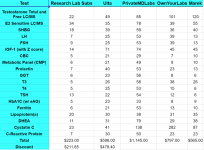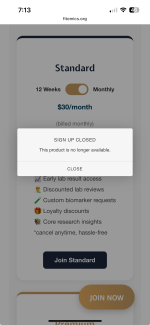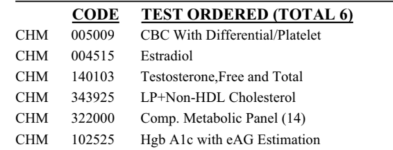Don Ligero
GLP-1 Apprentice
For those of you interested, the podcast of the CEO of Fitomics, Dr. Cody Haun with RPStrength finally dropped.


I have a message out to the owner asking about it. Will update when I get a response.@Don Ligero did the standard membership shut down? Screenshot below of what happens when you go to sign up.
View attachment 6625
Reopened until 5/31 and then only premium will be available.@Don Ligero did the standard membership shut down? Screenshot below of what happens when you go to sign up.
View attachment 6625
I will definitely join Fitomics, like their pricing for IGF-1 is a no-brainer.
But Ultra's price for TST with estrogen levels ($49 combined in one package) is not as bad as I assumed looking at the comparison table (which seems to show it would be $49+$35, or $84).
View attachment 6446
For the many other tests at Ultra like Lipoprotein(a) and C-Reactive Protein, the table is still right (though some prices at Ultra have gone up $1).
going with the cable tv model where they bundle a bunch of stuff you don’t want in order to upcharge? 🙁 it’s a bummer watching places move through the stages of launching, getting popular, then jacking up prices.Reopened until 5/31 and then only premium will be available.
So you’ll cancel your cheaper membership just because others might have to pay more for joining later than you? lolYeah, I'll probably be canceling my membership if thats the case. Their are other options that are more straight forward and it feels wrong to support such a blatant move.
Feedback is appreciated and passed along. Do what you gotta do that is best for you. Lock in early and keep it going. The earliest adopters got in for $20 per month and as long as they do not cancel, they keep that rate.
Personally, I agree that the premium is not quite worth the squeeze yet... More features coming including viewing biomarkers plotted on charts over time color coded by value in reference range. Now that might be worth the premium.
They may need to tweak the model a bit. There are a number of customers who wait for a big sale, sign up, order 6 different tests, then unsubscribe. There are scenarios where they LOSE money on those transactions overall. With draw fees being taken from subscription prices, 6 draws is $50ish. So they are -$20 on the $30 subscription. Then the big sale of 26% off (easter), their margins are small to begin with. Say the member only buys a $6 test....
Maybe they need to limit the big discount sales to members that have been subscribed for at least 2 months...
Just spitballing here. Again, all feedback appreciated... the good and the bad.
Is there anyone even close?They're still more fair than most lab providers in the labs market.
Yes, but it depends on what specific test your looking for. the only test that fitomics crushes everyone else with is the igf1. Other tests can be had for the same or cheaper other places.Is there anyone even close?
Thanks for that, these are good resources that I didn't know about.Yes, but it depends on what specific test your looking for. the only test that fitomics crushes everyone else with is the igf1. Other tests can be had for the same or cheaper other places.
myblood.ai, drsays, etc..

Feedback is appreciated and passed along. Do what you gotta do that is best for you. Lock in early and keep it going. The earliest adopters got in for $20 per month and as long as they do not cancel, they keep that rate.
Personally, I agree that the premium is not quite worth the squeeze yet... More features coming including viewing biomarkers plotted on charts over time color coded by value in reference range. Now that might be worth the premium.
They may need to tweak the model a bit. There are a number of customers who wait for a big sale, sign up, order 6 different tests, then unsubscribe. There are scenarios where they LOSE money on those transactions overall. With draw fees being taken from subscription prices, 6 draws is $50ish. So they are -$20 on the $30 subscription. Then the big sale of 26% off (easter), their margins are small to begin with. Say the member only buys a $6 test....
Maybe they need to limit the big discount sales to members that have been subscribed for at least 2 months...
Just spitballing here. Again, all feedback appreciated... the good and the bad.
I made the mistake of going to quest for a Testosterone test and it only gave me the total T number not free... bummerI will definitely join Fitomics, like their pricing for IGF-1 is a no-brainer.
But Ultra's price for TST with estrogen levels ($49 combined in one package) is not as bad as I assumed looking at the comparison table (which seems to show it would be $49+$35, or $84).
View attachment 6446
For the many other tests at Ultra like Lipoprotein(a) and C-Reactive Protein, the table is still right (though some prices at Ultra have gone up $1).

You can post your results and we can go over them. or you can DM and we can chat about them. discord might be easier for that though.I made the mistake of going to quest for a Testosterone test and it only gave me the total T number not free... bummer
Once you get the above tests how do you make sense of the data? Do you guy learn and know how to read the results or use someone else to help you determine what the test means to you?
Thank you, I may do that 🙂You can post your results and we can go over them. or you can DM and we can chat about them. discord might be easier for that though.
You should be getting the sensitive (LCMS) versions of e2 and test. especially e2. But we're discouraged from talking trt here and encouraged to go to meso for that. DM me and I can help you.These are the tests I ordered at Fitomics:
View attachment 6767
Each test was about $5-$10, except the TST free and total was $15.
I ordered the CBC just as a new routine since eventually TRT can raise the number of red blood cells and therefore risk of clotting. I will do a PSA test next time, but it was already in my recent labs at the doctor's office.
The lipid panel and A1C is just to see how much the weight loss and tirz is helping in those areas. The CMP was cheap so I threw it in.
I also ordered an IGF test separately for "shits and giggles" since Fitomics offers it cheaper than anyone else (about $13).
Another company with good pricing:

DrSays | Online Doctors $25-$35 most teledoc visits
www.drsays.com

I did a search and didn't see this list here... Testing Options
It is a listing of places and prices for testing. I hope you folks see some benefit in this...
I am curious how you decided which tests to take. You mentioned high triglycerides in another thread, was that a test you had done here? I want to do some testing, but am not sure how to determine which are important and which i need to go back for intermittently. I think i would like to know about triglycerides as well as any vitamin deficiencies, also the free T, to name a few.These are the tests I ordered at Fitomics:
View attachment 6767
Each test was about $5-$10, except the TST free and total was $15.
I ordered the CBC just as a new routine since eventually TRT can raise the number of red blood cells and therefore risk of clotting. I will do a PSA test next time, but it was already in my recent labs at the doctor's office.
The lipid panel and A1C is just to see how much the weight loss and tirz is helping in those areas. The CMP was cheap so I threw it in.
I also ordered an IGF test separately for "shits and giggles" since Fitomics offers it cheaper than anyone else (about $13).
